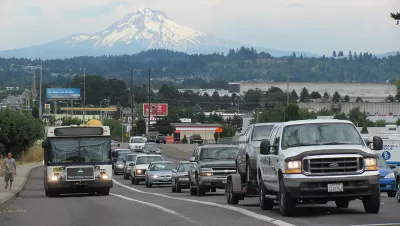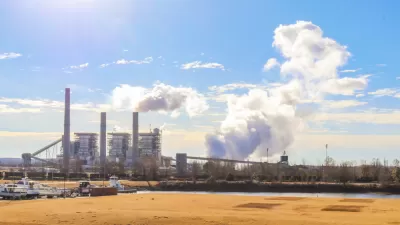Climate-friendly government policies and recent investments by energy companies are accelerating the growth of renewables.

After drastic declines in driving thanks to pandemic closures, traffic and carbon emissions are making a fast recovery as we inch toward a post-COVID world. The International Energy Agency has started releasing monthly data on carbon emissions, letting researchers understand trends from month to month and monitor changes as they happen. "In its latest Global Energy Review, the IEA found that Covid-19 touched off the biggest annual drop in carbon emissions ever," writes Liam Denning for Bloomberg, "down almost two billion tonnes, or about 6%."
However, "lower demand for electricity wasn’t the biggest factor behind that. The vast majority of it was explained by increasing penetration of renewable energy, whose share of global generation recorded its biggest annual gain ever." In the U.S., federal policy is also supporting a shift to renewable energy, with the Biden administration's focus on climate poised to "reset the economics of energy and related fields to take account of the climate challenge."
Because "a systemic problem like climate change demands systemic solutions," periodic and accidental reductions in emissions caused by global crises aren't enough to move toward a more sustainable future. If recent trends continue, "the power sector’s technology-based decline in emissions" will last well beyond the pandemic as major energy companies continue to invest in renewables and clean energy infrastructure.
FULL STORY: Carbon Emissions Made a Rapid Recovery From Covid

Planetizen Federal Action Tracker
A weekly monitor of how Trump’s orders and actions are impacting planners and planning in America.

Maui's Vacation Rental Debate Turns Ugly
Verbal attacks, misinformation campaigns and fistfights plague a high-stakes debate to convert thousands of vacation rentals into long-term housing.

Restaurant Patios Were a Pandemic Win — Why Were They so Hard to Keep?
Social distancing requirements and changes in travel patterns prompted cities to pilot new uses for street and sidewalk space. Then it got complicated.

In California Battle of Housing vs. Environment, Housing Just Won
A new state law significantly limits the power of CEQA, an environmental review law that served as a powerful tool for blocking new development.

Boulder Eliminates Parking Minimums Citywide
Officials estimate the cost of building a single underground parking space at up to $100,000.

Orange County, Florida Adopts Largest US “Sprawl Repair” Code
The ‘Orange Code’ seeks to rectify decades of sprawl-inducing, car-oriented development.
Urban Design for Planners 1: Software Tools
This six-course series explores essential urban design concepts using open source software and equips planners with the tools they need to participate fully in the urban design process.
Planning for Universal Design
Learn the tools for implementing Universal Design in planning regulations.
Heyer Gruel & Associates PA
JM Goldson LLC
Custer County Colorado
City of Camden Redevelopment Agency
City of Astoria
Transportation Research & Education Center (TREC) at Portland State University
Jefferson Parish Government
Camden Redevelopment Agency
City of Claremont





























